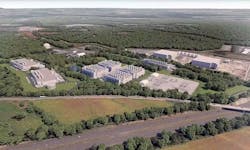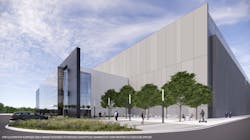When Will Virginia's Leesburg Cluster Catch Up to Ashburn's Data Center Alley?
If it really ever was thus, Loudoun County's greenfield data center frontier in Leesburg, Virginia is certainly no outlier in development these days. The location is now apparently on some kind of pace to pick up where Ashburn's famed, overcrowded Data Center Alley leaves off, literally just down the road.
Of course, it's not just Leesburg that's angling for data centers; supervisors and planning staff from Loudoun, Prince William and Fairfax counties are now also grappling with their own challenges in considering new data center projects, as they are in counties around the state, on the basis of support by new tax incentives and grants.
However, we've kept an extra keen eye on new data center development in Leesburg since the Leesburg Town Council passed data center design guidelines in August 2023.
We also can't talk about Leesburg Data Center Cluster developments without talking about the property investment firm who has so far made the largest mark there, the real estate investment management services provider TA Realty LLC.
In 2021, the company unveiled plans for a 1.5 million square foot data center campus near Leesburg, which was then just emerging as a new data center hub in the Northern Virginia data center market.
The Leesburg project was the first step in a larger push into the digital infrastructure market by TA Realty, a private equity investor with lengthy experience in commercial real estate.
Dedicated to Hyperscale Data Center Development
TA Realty’s plans for the campus in Leesburg called for an investment of $1.8 billion to create up to seven data center buildings with an on-site power substation.
The campus is situated between a Google data center and the site of a Microsoft cloud campus near the Leesburg Executive Airport. To the south is a campus for wholesale data center provider Compass Datacenters, who often works with hyperscale players.
In November 2023, TA Realty announced a signed lease agreement with a single global cloud services provider for the full 430 MW data center campus in Leesburg, another jewel in Loudoun County's data center crown, the construction of which is now well along.
This month, TA Realty announced its launch of a dedicated hyperscale data center development arm within the firm’s digital real estate team. The launch expands TA Realty’s presence in the competitive digital infrastructure space as promised, backed by 40 years of experience in the private equity real estate management business.
TA Realty emphasized that its digital real estate team specializes in sourcing and developing strategic locations in Tier I data center markets and ecosystems, where land and power are scarce commodities. The firm has active developments for over 1.2 GW of committed power in various locations.
With a focus on both data center campuses and edge deployments in key North American markets such as Northern Virginia, Atlanta, and Chicago, TA Realty said its hyperscale development team will focus on developing resilient digital infrastructure assets.
The company further announced that its dedicated hyperscale data center development unit is headed by Tim Shaheen. With more than 20 years in the data center and IT sectors, Shaheen previously served in executive roles at EdgeConneX and Aligned Data Centers, before joining TA Realty in 2023.
“Appointing Tim to lead the digital infrastructure development team marks a strategic move to streamline our data center developments and scale top-tier assets in key markets,” said Allison O’Rourke, Partner at TA Realty. “His collaborative approach and digital acumen will be invaluable as we expand in this dynamic sector.”
“I am thrilled to lead the TA Realty hyperscale development team,” said Shaheen. “The firm’s commitment to working with the community to deliver exceptional solutions aligns perfectly with my own passion for innovation in the data center industry. TA Realty will leverage our collective expertise to pioneer new possibilities, elevate construction experiences, and empower businesses for success in the rapidly evolving digital landscape, while embracing opportunities with and for the communities we serve."
In addition to Shaheen, Adam Black has joined TA Realty as part of the digital initiative, and will be responsible for overseeing design and construction of all data center assets.
Black has 26 years of construction experience, the last 12 of which have been focused on the hyperscale mission-critical space. Most recently, he led all infrastructure projects in the Mid-Atlantic region at Google.
“I’m excited to have Adam join the team as we continue to navigate the complexities of high-demand data center markets,” remarked Shaheen. “With a track record in strategic development, Adam's insights will guide TA Realty in delivering cutting-edge solutions to meet the evolving needs of the digital landscape."
Data Center Frontier's Conversation with TA Realty's Tim Shaheen
This month, Data Center Frontier had the following conversation via email with TA Realty's Tim Shaheen.
DCF: What's the overall data center development outlook from the perspective of the imminent data center cluster in Leesburg led by TA Realty? Could you offer any perspective on what broke the dam to make Leesburg such a fortuitous location for hyperscale development planning nearby already jam-packed Ashburn in Loudoun County?
Tim Shaheen, TA Realty: Navigating the current landscape of limited land and power constraints is no easy task. As core Ashburn becomes increasingly difficult to source land parcels at scale, the move west was both a natural release valve and a necessity given the extension of network infrastructure to serve this submarket.
As several end users are pursuing self-perform projects in other parts of Loudoun, the opportunity for further expansion of the ecosystem became a requirement.
The Leesburg cluster also requires a deep understanding of both zoning and entitlement elements, and working in close collaboration with local officials has never been more important to ensure all boxes are checked and satisfied by the County and the Village of Leesburg.
TA Realty worked in concert with Loudoun Water to expediate construction of a regional pump station for distribution on part of the owned land, which factored into the progression of the development.
DCF: Could you comment on any zoning updates from the Leesburg Council; or provide any analysis of the Council’s data center design guidelines issued last year, and the hallmarks of its attitude toward new development?
Tim Shaheen, TA Realty: TA Realty understands the concerns being voiced both in regard to zoning matters and data center design and is supportive of these changes.
As a firm, TA Realty plans to give higher priority to data center development opportunities in areas where data centers are already approved for use, and will look to exceed minimum zoning requirements where possible in order to better address potential setbacks, buffering, and other concerns.
The firm also aims to design projects that will exceed the data center design guidelines of the municipalities where TA Realty is developing to the extent the design is not specific to a customer.
For customer-driven designs, TA Realty will at least meet the criteria of these data center design guidelines, and the firm plans to encourage additional considerations with the customers.
TA Realty monitors the continued developments in the areas of sustainability for data center design and development, which is often a major area of focus for customers.
DCF: Do you have any update or further briefing on the capabilities of TA’s 430 MW hyperscale campus development in Leesburg?
Tim Shaheen TA Realty: The construction of the campus in development is fully underway, with major pad work completed for the first two data centers and building foundation work in progress.
The substantial completion of the shell construction of these first two buildings is expected to be completed by 2025.
The site work for buildings 3, 4, and 5 of the project is scheduled to commence in early 2024 with building construction starting next year.
In addition, TA Realty recently completed the underground foundation for a regional pump station being constructed on behalf of Loudoun Water. This regional pump station aims to support the growth of further data center, mixed use, and residential uses planned for the local area surrounding TA Realty’s project.
The firm is very excited to see this project move into the major construction phase and to see the data center campus become a reality.
Stack Infrastructure Expands NoVA Data Center Footprint to Leesburg
In the first part of January, NoVA data centers stalwart STACK Infrastructure announced its new 72 MW Leesburg campus in Loudoun County.
The addition of the NVA06 Campus will solidify STACK’s prominence in the region, bringing its Northern Virginia data center sites to a total of 1.2 GW built or under development capacity across Loudoun and Prince William Counties.
STACK Infrastructure's full Northern Virginia data center footprint is viewable here.
STACK said the 72 MW Leesburg development will further position the operator to support the higher rack densities and cutting-edge cooling technologies that accompany delivery of AI-ready capacity in the world’s largest data center market.
“This latest announcement epitomizes STACK’s dedication to responsibly delivering scale,” said Brian Cox, CEO of STACK Americas. “At STACK, we’re committed to delivering technological innovation while positively impacting the surrounding community to foster growth and cultivate a more economically rewarding future.”
Situated on 32 acres in Leesburg, STACK's newest Loudoun County campus features a 48 MW building set to deliver 2Q 2025, and a 24 MW building to follow soon after, all served by committed power from Northern Virginia Electric Cooperative (NOVEC).
As stated in a press release, "The site includes AI-ready capabilities built upon STACK’s proven, customizable design with diverse cooling solutions for high-density workloads. This latest development strengthens STACK’s ability to cater to top technology firms in Northern Virginia and globally."
“STACK Infrastructure’s investment in Leesburg marks an exciting chapter in our mission to promote a thriving local economy,” remarked Kristen C. Umstattd, Supervisor - Leesburg District. “Data centers in Loudoun County drive tax revenue, and STACK’s investment will support our ability to continue investing in important community services. STACK is an excellent community partner, and I am excited for their decision to locate here.”
Featuring a portfolio of 2.5+GW in data centers built or under development, along with an additional 4.0+GW of planned and potential development across major data center markets worldwide, STACK's notable recent expansions include a planned five-building campus offering 250 MW of scale in Central Phoenix with a dedicated on-site substation; as well as robust data center developments in Santa Clara, Toronto, Dallas/Fort Worth, Portland and New Albany, Ohio, along with data center campuses in Japan, Australia and Stockholm.
How the Leesburg Data Center Cluster Expansion is Exceeding Even Leesburg
On January 30, the Loudoun Times-Mirror reported that the Loudoun County Board of Supervisors is set to vote in March on a 112-acre data center project between Leesburg and Belmont. During a Jan. 10 meeting, the board voted to send the application, dubbed the Belmont Innovation Campus, to the March 13 public hearing.
According to the reporting, a special exception application from SDC Capital Partners asks supervisors to increase the permitted data center square footage by 1.9 million, bringing the total from 2.9 million to 4.8 million.
In exchange, the developer would agree to several road improvements, design standards and environmental contributions, including tree conservation and reforestation, and providing a park area with a trail, pavilion and canoe launch for public use.
"The application has stirred concerns from some supervisors over the county’s power constraints and new transmission lines that have been proposed as a result," noted the Loudoun Times' Jess Kirby.

Matt Vincent
A B2B technology journalist and editor with more than two decades of experience, Matt Vincent is Editor in Chief of Data Center Frontier.








